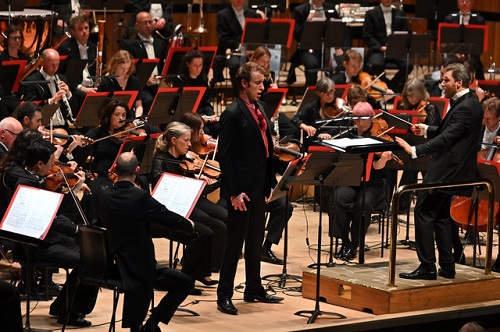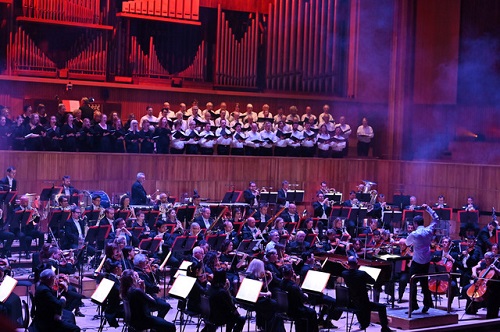The anniversaries of composers always provide a decent opportunity to hear music we rarely do. Serge Rachmaninoff’s 150th anniversary is a major chance to do that – although he is hardly a neglected composer today, even if he might have been when the first Pelican Guide to classical music, edited by Robert Simpson, was published in the 1960s.
Rachmaninoff wrote some sixteen choral works between 1890 and 1926, of which only The Bells and All Night Vigil are well known. He ceased composing any opera after 1906 and of the ten he attempted, projected or finished only a single one exists in a complete format – The Miserly Knight. Rachmaninoff composed no songs after 1916, although at least seven cycles exist.
Rachmaninoff has always occupied something of questionable reputation with conductors and musicians – indeed Robert Simpson had written in the 1960s that he was a ‘minor’ composer, a view that would never be accepted today; Leonard Bernstein went even further than Simpson describing his music as ‘garbage’. Some of the greatest pianists have never played either his concertos or any of his solo works – despite their clear greatness (the Piano Concerto No.3 is arguably the finest of the twentieth century). Likewise, many great conductors have avoided his symphonies. My view of Rachmaninoff is very much the opposite of this and throughout the rest of this year there might be more of his music in my reviews than usual. The Bells will feature in three of them in the next few months alone.
The trilogy of works on the Philharmonia’s program, from three different Russian composers, were all written between 1910 and 1913 – a period of enormous upheaval in Russia, one that stretched between the 1905 revolt (after Russia’s defeat in the 1904 Russo-Japanese War) and just before the 1917 Revolution. Both Scriabin and Rachmaninoff had left Russia during this period of unrest, although The Bells was not written in the United States but mostly in Modest Tchaikovsky’s flat in Rome (along with the Piano Sonata No.2).
The Bells, based on a poem by Edgar Allen Poe, had already inspired other composers before Rachmaninoff. Joseph Holbrooke had had his work based on the poem premiered in Birmingham by Hans Richter in 1906. Originally, Rachmaninoff conceived The Bells as a choral symphony along the lines of Beethoven’s Ninth but its more obvious precedents became works like Schoenberg’s Gurrelieder and Ravel’s Daphnis and Chloé. The use of the bell as an influence itself wouldn’t be new for Rachmaninoff either – he had used it in his piano music going back to the Prelude in G-sharp minor and the opening of the Piano Concerto No.2 – it’s a similar pattern with the ‘Dies Irae’ (which is here, too) and which features in many of his works over decades.
Arguably, what Rachmaninoff sets as a libretto for The Bells resembles in short measure what Poe wrote. Poe’s greatness may be less in the actual merits of his prose or poetry and more in the brilliance of his ability to create a memorable story. Ostroglazoff’s one act opera, The Masque of the Red Death, written in 1896, for example, hadn’t referred in the slightest to the American text but used just a Russian translation. The Bells was based entirely on a translation by Konstantin Balmont, a symbolist poet, who turned Poe’s heavy-handed, unmelodic and repetitive text into something considerably vaguer and more mystic; he removed Poe’s cool detachment and composed something which came closer in emotional intensity to a work like 1909’s Isle of the Dead.
Great performances of The Bells aren’t common in my experience; possibly the last I came across was given by Svetlanov, just weeks before he died. One advantage Stanislav Kochanovsky had with the Philharmonia Orchestra was its willingness to follow his careful phrasing of dynamics. The sleigh bells in the first movement are represented through clarinets and flutes – but they needed to be floated like clouds and as light as snow and they were. Luminosity, and clarity, were pointedly in high definition. The tenor (here sung by Toby Spence) begins as a mirror to the choir – his soft, understated but long high E-flat a contrast the ff of the choir. I didn’t quite find Spence youthful enough, firm enough in his register, this first movement supposedly being the beginning of the trilogy of man’s journey through life.
Perhaps unsurprisingly, in the second movement – with the bells representing the mellowness of the wedding – it falls to the soprano to continue the narrative. This Lento is more emotional, steered in a more orthodox Russian tradition of richness in the music. Anush Hovhannisyan sang with great beauty, and almost erotic power. Her voice was large enough to rise over the orchestra which overwhelmed the more dreamy – almost Wagnerian sensuousness – she brought to her phrasing which made me question why she hadn’t been more absorbed into the body of the orchestra more. The lushness of the Philharmonia strings often felt at odds with the velvety warmth of Hovhannisyan’s voice when they might have been better melding together.

The terror of the third movement – which has no soloist – was beautifully done. Perhaps here the sheer bloom of the harp was a voice in itself; the solo violin too. Brass climaxes work in synchronicity with raging choral forces. It was all forcefully achieved at a solid Presto. The spectre of man’s death hangs over the final movement, a Lento lugubre (‘The Mournful Iron Bells’), and it fell to the Ukrainian baritone Yuriy Yurchuk to take us to its closure. Although this work ends in a kind of solitude it has to go through catastrophe to get there. A wonderfully austere lamentation on the cor anglais preceded Yurhcuk’s devastating first entry – with Kochanovsky uniting the gloom-laden chorus, bereft baritone and harrowing-sounding orchestra towards the Dies Irae. Yurchuk sang with solemnity, and a rich emptiness; the chorus a depth of wordless power to evoke the bells. The resignation at the end had the hollowness of profundity to it.
Not all non-Russian performances of The Bells reach this kind of excellence. Some things I would have preferred to have been different – soloists to have been set deeper within the orchestra rather at the front of the stage; violins to have been divided so we got a better richness in the string sound.
The second work on the program, Anatoly Lyadov’s From the Apocalypse, written in 1912, was inspired by the Book of Revelation – although no one quite knows why Lyadov turned to it, and the work goes against much of this composer’s orthodoxy. Lyadov is best known as a miniaturist composer. From the Apocalypse is written for very large orchestral forces, however. No matter how colourful the orchestration might be for this work, it is frankly a very peculiar piece. It never quite goes anywhere. Through its ten-minute length it tries to reach a climax – and then collapses; and it does this repeatedly. The trumpets of the Last Judgment are clearly there but when we do get the timpani ending I really did wonder if the preceding journey had been worth its length despite the effort that Kochanovsky and Philharmonia clearly gave in playing it.
The final work, Alexander Scriabin’s Prometheus: The Poem of Fire, from 1910, was quite another matter. The rarity value of this performance was that it was given as Scriabin intended it to be done – with light. Everything about Prometheus is on the vastest of scales: the orchestra is huge, it uses an organ, a chorus and is to a large extent, given the sheer brilliance and scope of the piano writing, a near concerto for the instrument – indeed, the soloist is perhaps better described as the prophet in this score.

The reason Scriabin experimented with light in Prometheus is because he had a form of synaesthesia – a sensory disorder, which in Scriabin’s case, made him associate colour with musical pitch. Although synaesthesia is to a large extent unidirectional, in Scriabin’s case it probably did not work in the opposite way, although all composers clearly write music which uses some form of colour even if they never see it as light. The colour is produced via a keyboard – and in great impressionist washes, usually of violet as the composer specified.
Scriabin’s music, even for 1910, is harmonically challenging and rhythmically transparent – a progressive and heavily mystic form that outstripped anything Rachmaninoff composed at the time. Scriabin himself was almost a kind of Rasputin figure – notably cultish, by all accounts – and the ambition of a piece like Prometheus challenges perceptions and senses when performed in the way he composed it. This was heightened during the performance by both the male chorus and the conductor stripped down to white shirts to absorb the colours – but it also gave them the appearance of Russian priests (although in practical terms, white shirts tucked in at the waistband would have looked distinctly odd).
The orchestration is blazingly violent at times, dissonant and if the music begins in a kind of stasis it ends in a choral explosion. The light itself – at least as it was present here – emerged often as a flood of colour, bleeding reds, blues, greens and violet, or just a piercing white. It often seemed to just appear as a spotlight within the hall itself. Although the orchestra is massive, Scriabin often seems to use it with economy. The only differential to this, however, is the dominant piano part which is immersed almost entirely within the score – and here it was superbly played by Alexei Volodin. The part is Promethean in scale and it was delivered with superlative skill and virtuosity. T he Philharmonia Chorus, although they only enter at the work’s climax, were thrilling. Simon Bennison’s lights, given that Scriabin hadn’t left any specific instructions on how they should be used in performance, were effective and worked with the music well.
This had been a concert where the most radical work had been left to the end, and the least radical had begun it. The beginnings of Russia’s turmoil in 1905 to its final descent into revolution in 1917 had been seen through a prism of composers almost in reverse of their musical innovation, however; one almost, in fact, craved for post-revolutionary works like Mosolov’s Iron Foundry to place the complete decline of Russian Romanticism and its ruling class in its proper context. Nevertheless, what we got was often superbly done and in itself a brilliant setting of music that encompassed the ecstasy and ending of Russian composers setting their scores within the country’s turbulent history.
Marc Bridle
Rachmaninoff, The Bells; Lyadov, From the Apocalypse; Scriabin, Prometheus: The Poem of Fire
Alexei Volodin (piano), Anush Hovhannisyan (soprano), Toby Spence (tenor), Yuriy Yurchuk (baritone), Philharmonia Chorus, Gavin Carr (chorus master), Philharmonia Orchestra, Simon Bennison (lighting designer), Stanislav Kochanovsky (conductor)
Royal Festival Hall, London; Thursday 11th May 2023.
ABOVE: Anush Hovhannisyan (soprano) and the Philharmonia Orchestra conducted by Stanislav Kochanovsky (c) Mark Allan